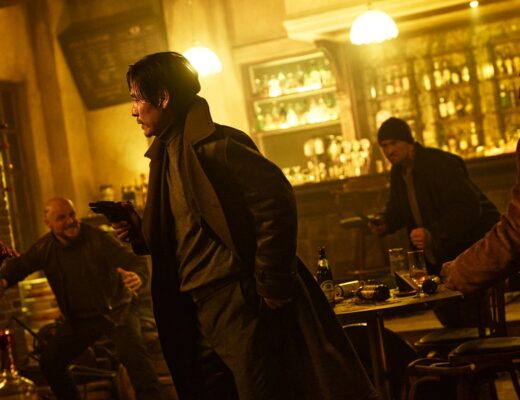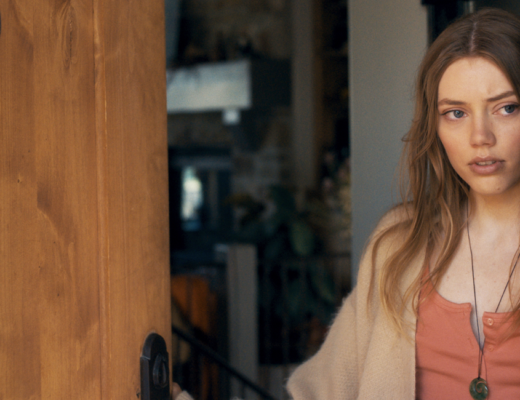Delmer Daves has his deserved champions, but even so, he’s an interesting sell; not a hard one, per se, but one that’s mildly inundated with caveats and hesitant admissions. Kent Jones aptly touted Daves’ directorial penchant for goodness, benevolence of all kinds, which implies a risk of saccharine moralizing, closer to Shane than The Naked Spur. Also per Jones: “Daves could be counted as one of [the auteur theory’s] casualties.”
Less courteous readings of 1957’s 3:10 to Yuma would connect it to Fred Zinnemann’s turgid High Noon, but Daves isn’t as concerned with matters of honor and bravery as he is universal bonds, those that transcend the easy divides of good and evil that color more popular — and less worthwhile — westerns. His films are populated with singular types, who run the gamut from endearingly stubborn to gleefully violent, but one shouldn’t anticipate combustion as much as they should communion, a subversive purview that pitches itself in the sliver of tolerability between naivete and obliviousness. Like Daves’ other films, 3:10 to Yuma initially exists as a taught suspense western, so much so that the jump to reconciliation is all but predictable. Based on a svelte but rich Elmore Leonard story, the film pits hard-luck rancher Dan Evans (Van Heflin) against seasoned criminal Ben Wade (Glenn Ford), as the former becomes the sole guard and prison escort of the latter as they await the eponymous train to make its stop in Contention City, Arizona. Every pitfall of the potentially ill-advised task comes attached with a pragmatic rebuttal: for one, Wade’s gang roams the peripheries, but the current drought makes the promised cash of the prisoner’s deliverance all the more appealing; plus, Dan is a reputed deadeye shot, any sort of delusional grandeur tempered by faith in his innate skill.
Anxiety of all shades is palpable throughout, whether it be the aforementioned money worries, or the fact that Wade’s gang engenders fear in the hearts of simple townsfolk, his name well-known amongst this deceptively self-enclosed milieu. No one wants to be broke, but no one wants to end up dead either, which is what makes the unflappable Ben’s taunting bribes all the more appetizing, their growing appeal matched by the sweat accumulating on Dan’s brow. Holed out in a hotel room, the criminal outfitted in handcuffs, the guard a double-barrel shotgun, the actors engage in something of a fitful two-hander, occasionally interrupted by similarly jittery posse members. As soon as Ben’s right-hand man, Charlie Prince (played by the ever-reliable Richard Jaeckal), comes galloping into Contention, the already paltry defenses disperse, leaving Dan accompanied only by his rotund benefactor, Mr. Butterfield (Robert Emhardt), and barely capable friend, Alex Potter (Henry Jones).
Maybe it’d be easier for Dan to flag and take the cash, but Daves is more interested in fashioning a slippery western, one where the sense of duty on the part of Heflin’s deputy (who’s even emasculated in front of his wife and children while making a quick stop home with Ben) is more internal than external. He’s no lawman, and that disrupts any sort of schematic hero-villain reading, especially considering that the two men come to something of a mutual respect by the close. The odd-couple chemistry is milked for every cool dig that Ford seems to pluck from the air, and for every nervy, shifty-eyed stare Heflin gives. Their concluding interval of teamwork may skirt the sentimental (though Ford does get to satisfyingly mutter “I don’t like owing nobody any favors”), but then Daves’ own symbolic filmmaking acumen does the heavy lifting. Forever allergic to any sort of compositional filler, Daves and cinematographer Charles Lawton Jr. are always craning, pulling back or simply angling to truly capture the all-encompassing, yawning isolation of the Arizona territories in 3:10 to Yuma, which therein resides the governing paradox of both his film and the entirety of the American West. For something so expansive, its inhabitants are made so small, sequestered in arid outpost towns whose hotel lobbies and saloons are just as depopulated as the surrounding desert, and at the mercy of a natural world that has no sympathy for the individual, no matter how enterprising. This cruel truth is realized by Ben himself, who, within a matter of minutes, shoots one of his own, too trigger-happy men, and jumps at the possibility of an enduring romance, even as the threat of the marshal looms.
The two leads further represent the albatross of their dead-end frontier just in their appearance: Heflin’s visible exhaustion, a polite despondency that tries its best to quell itself in the face of his wife, Alice (Leora Dana), and their, children; Ford, playing against type, has the brute handsomeness of a high school jock trapped in a body twice the age, his nonchalant exterior weathered nevertheless. Daves can mostly eschew a showdown because of this shared lassitude (plus, he’s already committed one of the most grisly killings in any western to film — it makes itself plain enough when the time comes), thus making the significance of any present human life all the more resounding. He can also dip into the fatalistic (the funeral drive slowly wending through Contention City), because of the already established stakes of what some come to consider as Dan’s own death drive. And finally, in a gesture of divine providence, he can let the heavens open up at the close, because the goodness displayed isn’t deserving of any drought.
Part of Kicking the Canon – The Film Canon.







